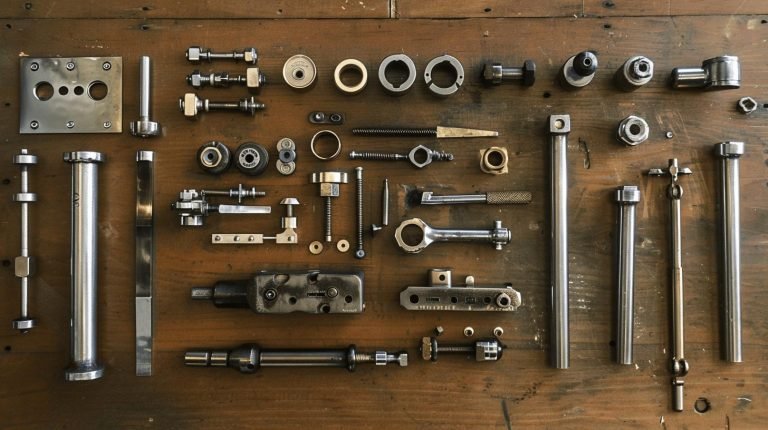Are sizing errors in door hardware orders draining your project budget and time? Accurate measurement is vital but often overlooked, leading to costly compatibility issues. By implementing precise measuring techniques, you can sidestep these problems and ensure a seamless fit for your projects. This article highlights the common pitfalls in ordering door hardware wholesale and provides actionable strategies to guarantee order accuracy. Learn how to prevent sizing mistakes and secure the perfect fit every time, giving your DIY projects the durability and professional touch they deserve.
Avoiding Incorrect Sizing in Door Hardware Orders
Accurate measurement is a cornerstone in ensuring door hardware orders are fulfilled correctly. Incorrect sizing is a common order error that can lead to significant compatibility issues and additional costs. It’s essential to verify measurements at multiple points to guarantee that components fit properly. Many pitfalls occur when relying on single-point measurements or failing to consider variations in manufacturing standards. This oversight can result in hardware that does not align with existing door configurations, leading to misalignments and operational failures. To mitigate these issues, consider the following measurement tips:
- Measure the width, height, and depth of the door frame separately.
- Use a reliable measuring tool to ensure precision.
- Double-check the thickness of the door for hinge compatibility.
- Confirm the backset measurement for latch and lock alignment.
- Record all measurements accurately and keep them accessible for reference.
Errors in sizing can have several adverse effects, including increased project timelines and costs due to reordering. Incorrectly sized hardware may necessitate additional labor for adjustments or replacements, further straining budgets and schedules. Implementing a checklist system before placing orders can greatly reduce these risks. This approach ensures that all necessary specifications are reviewed and confirmed, minimizing the likelihood of errors. By prioritizing detailed measurement verification, businesses can maintain efficiency and avoid unnecessary complications.
Choosing the Right Materials for Durability and Performance

Selecting the appropriate materials is crucial in ensuring the functionality and longevity of door hardware. The choice of material directly impacts not only the hardware’s performance but also its resistance to wear and environmental conditions. Understanding the properties of different materials can guide you in making informed decisions that enhance both the durability and efficiency of the hardware components.
Steel
Steel is highly regarded for its energy efficiency and durability, making it a popular choice for components like friction stay hinges. Its robust nature provides excellent support and security, ensuring that door hardware withstands significant stress and environmental factors. Additionally, steel’s energy-efficient qualities contribute to reducing thermal transfer, which is particularly beneficial in maintaining energy performance in buildings. This makes steel an ideal material for both residential and commercial applications where durability and energy efficiency are paramount.
UPVC
UPVC is favored for its modern design aesthetics and low maintenance requirements. This material is known for its resistance to moisture, corrosion, and weathering, making it suitable for use in various environmental conditions. UPVC’s aesthetic versatility allows it to be molded into various shapes and finishes, accommodating a wide range of design preferences. Its lightweight nature also simplifies installation, making it a practical choice for contemporary architectural projects focused on style and functionality.
When selecting materials, it’s imperative to avoid counterfeit products that can compromise hardware performance. Ensure supplier reliability by verifying their reputation and product authenticity. Counterfeit materials often lack the necessary quality and durability, leading to potential failures and increased maintenance costs. Opting for reputable suppliers with a track record of quality assurance can safeguard against these risks and ensure the longevity and effectiveness of your door hardware investments.
Ensuring Accurate Order Quantities
Ordering incorrect quantities in wholesale door hardware can lead to significant project delays and budget overruns. When the required components are not ordered in the right amounts, projects can stall, waiting for additional supplies, which in turn can disrupt project timelines and inflate costs. Conversely, overordering can result in surplus inventory, tying up capital and storage resources that could be better allocated elsewhere. Such errors not only affect immediate project efficiency but can also strain long-term financial planning.
To accurately estimate the necessary quantities, implement a systematic approach to ensure precision:
- Assess Project Needs: Begin by evaluating the specific requirements of your project, considering both current and future demands.
- Consult Blueprints and Plans: Use detailed architectural plans to determine the exact number and type of hardware components required.
- Factor in Waste and Replacements: Include a margin for potential waste and replacements due to unforeseen damages or errors.
- Review Past Orders: Analyze previous orders for similar projects to gauge typical usage patterns and avoid repetitive miscalculations.
Effective inventory management is crucial to align order quantities with project timelines. Establishing a robust inventory system can help monitor stock levels, ensuring that you avoid overstocking while maintaining adequate supplies. Regular audits and real-time inventory tracking can provide insights into consumption patterns, allowing for adjustments in ordering strategies to match project needs accurately. By fine-tuning these processes, businesses can enhance operational efficiency and minimize the risks associated with ordering errors.
Selecting Reliable Suppliers for Wholesale Purchases

Choosing a reliable supplier is essential to maintaining quality assurance in wholesale door hardware purchases. A supplier’s reliability directly impacts the quality of the products received, influencing both customer satisfaction and project success. Without a dependable supplier, businesses risk receiving inconsistent or subpar products that can lead to increased costs and delays. Therefore, investing time and effort in evaluating potential suppliers is a critical step in ensuring the integrity of the supply chain.
Evaluation Criteria
When assessing suppliers, several key criteria should be considered to determine their reliability and suitability. First, the supplier’s reputation in the industry provides insight into their track record and reliability. A well-regarded supplier typically has a history of delivering quality products and maintaining strong relationships with clients. Customer feedback is another valuable resource, offering firsthand accounts of the supplier’s service quality and responsiveness. Positive reviews and testimonials can reinforce confidence in a supplier’s ability to meet expectations.
Product quality is another crucial factor in supplier evaluation. It is important to ensure that the supplier consistently delivers items that meet or exceed industry standards. Requesting samples or conducting quality checks on initial orders can help verify that the products meet the necessary specifications. Additionally, evaluating the supplier’s customer service can provide insights into their commitment to addressing issues and supporting client needs. A supplier that offers excellent customer service is more likely to resolve problems efficiently and maintain a positive business relationship.
Maintaining long-term relationships with suppliers is beneficial for ongoing business success. A strong relationship can lead to advantages such as better pricing, priority service, and increased flexibility. Starlight Hardware exemplifies excellence in the industry by consistently delivering high-quality products and fostering positive relationships with clients. By prioritizing reliable supplier partnerships, businesses can enhance their operational efficiency and secure a steady flow of quality door hardware.
Understanding Product Specifications and Technical Details
Misunderstanding product specifications is a prevalent issue that can lead to mismatched hardware, causing delays and additional expenses. This often occurs when technical jargon is not clearly understood, leading to incorrect assumptions about a product’s capabilities or compatibility. Vague or incomplete product descriptions can further exacerbate this problem, leaving buyers with items that do not meet their functional or aesthetic needs. To mitigate these issues and ensure that the hardware ordered aligns with project requirements, it is crucial to thoroughly review product details and clarify any ambiguities before making a purchase.
- Verify dimensions and measurements to ensure proper fit.
- Confirm material composition for durability and performance.
- Check for compatibility with existing systems or hardware.
- Understand the intended application and limitations.
- Assess the finish and aesthetic to match project design.
- Review installation requirements and necessary tools.
Consulting with experts is an invaluable step in clarifying specifications and avoiding costly errors. Professionals can provide insights into technical details that may be overlooked or misunderstood. This consultation ensures that the selected hardware not only fits physically but also functions as intended within the given application. By leveraging expert advice, businesses can enhance their decision-making process, ultimately leading to more successful project outcomes and reduced chances of mismatches.
Securing Orders with Robust Confirmation and Verification Processes

Failure to verify order details can result in significant delays and additional expenses. Incorrect specifications or quantities can lead to receiving items that do not fit or function as needed, necessitating costly reorders and project disruptions. In wholesale door hardware transactions, these errors are magnified, affecting timelines and budgets across multiple projects. A robust verification process is essential to mitigate these risks and ensure that all order details align with project requirements. By meticulously confirming each aspect of an order, businesses can avoid the pitfalls of miscommunication and oversight that commonly lead to such costly mistakes.
- Validate all component measurements against project specifications.
- Cross-check material selections to ensure durability and performance.
- Confirm quantities to prevent overstock or shortages.
- Review supplier details to verify authenticity and reliability.
- Document all order confirmations for future reference.
Maintaining organized documentation of order confirmations provides several advantages. It enables quick reference for future orders, streamlines the reordering process, and helps resolve discrepancies efficiently. By establishing a well-documented confirmation system, businesses can enhance their operational efficiency and reduce the likelihood of recurrent errors. This proactive approach not only safeguards against immediate issues but also contributes to long-term project success by maintaining consistent quality and reliability in door hardware procurement.
Final Words
In prioritizing accurate measurements, selecting durable materials, and securing correct order quantities, one avoids common mistakes when ordering door hardware wholesale. Emphasizing the significance of reliable suppliers and understanding technical specifications is crucial in ensuring product compatibility and quality.
Adopting robust confirmation and verification processes helps secure and streamline orders, reducing the likelihood of costly errors. With a focus on accuracy and supplier reputation, successful bulk hardware procurement becomes achievable. This approach fosters efficiency, cost savings, and satisfaction in home improvement projects.
FAQ
Q: Are all front door handles the same size?
A: Front door handles are not universal. Sizes vary based on design and manufacturer. It’s crucial to measure your existing setup or check specifications to ensure compatibility with new hardware.
Q: Does door thickness matter for door knobs?
A: Door thickness significantly affects door knob fitment. Knob sets are designed for specific thickness ranges. Always check compatibility with your door’s thickness to ensure proper installation and function.
Q: What hardware do you need for a new door?
A: Hardware for a new door generally includes hinges, a door knob or handle, a lockset, a strike plate, and possibly a latch. Ensure all components match the door’s specifications for seamless assembly.
Q: Are front door handles universal?
A: Front door handles are not universal. Variations exist in size, style, and function. Confirming measurements and specifications before purchase ensures the handle fits your door and meets security requirements.
Q: How to buy the right door knob?
A: To buy the right door knob, assess door thickness, knob type, and style. Measure backset and ensure the knob is compatible with your existing latch system for a successful match.
Q: What is the hole size for a door knob?
A: Standard door knob holes are typically 2 1/8 inches in diameter, with a latch hole of about 1 inch. Verify measurements to accommodate specific door knob designs and ensure secure installation.





